Welcome to Club Cobra! The World's largest
non biased Shelby Cobra related site!
- » Representation from nearly all
Cobra/Daytona/GT40 manufacturers
- » Help from all over the world for your
questions
- » Build logs for you and all members
- » Blogs
- » Image Gallery
- » Many thousands of members and nearly 1
million posts!
YES! I want to register an account for free right now!
p.s.: For registered members this ad will NOT show
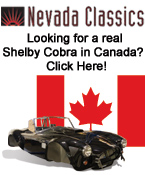 
 Main Menu
Main Menu
|
 Nevada Classics
Nevada Classics
|
 Advertise at CC
Advertise at CC
|
 February 2025
February 2025
|
| S |
M |
T |
W |
T |
F |
S |
| |
|
|
|
|
|
1 |
| 2 |
3 |
4 |
5 |
6 |
7 |
8 |
| 9 |
10 |
11 |
12 |
13 |
14 |
15 |
| 16 |
17 |
18 |
19 |
20 |
21 |
22 |
| 23 |
24 |
25 |
26 |
27 |
28 |
|
|
 CC Advertisers
CC Advertisers
|
|
 1Likes 1Likes

09-03-2007, 10:04 PM
|
 |
CC Member

|
|
|
Join Date: Mar 2001
Location: Provo,
Ut
Cobra Make, Engine: Kirkham, 427
Posts: 6,990
|
|

 Not Ranked
Not Ranked
Next hint,
After 40 years, things rust...and I HATE rust.
David
   |
-
Advertising


09-04-2007, 05:27 AM
|
|
CC Member

|
|
|
Join Date: Jan 2004
Location: Shawbury,
Posts: 325
|
|

 Not Ranked
Not Ranked
Heat treating the parts will make them grow a very small amount in volume, because the crystals with the metalurgical structure of hardened steel (martensite) take up more volume than that of non- hardened steel.
Maybe the hubs were out of specs?
On the other hand, 900 degree fahrenheit is more in the range of heat treating aluminium, than hardening steel. I can offer this as a second option.
The last thing that comes to my mind is that rust free chrome- moly steel will begin to rust when exposed to high temperatures, such as brake system parts are. That is because of the chrome will begin forming carbids with the carbon, and so a layer of chrome oxide will not protect the surface of the parts from oxygen any longer (that's what actually makes them rust free).
In order to re-solve the carbides and get the chrome back into the steel, solution annealing of the material is necessary.
That's all I can think of. No further ideas so far...
Simon
Last edited by CobraV8; 09-04-2007 at 05:47 AM..
|

09-04-2007, 12:19 PM
|
 |
CC Member

|
|
|
Join Date: Mar 2001
Location: Provo,
Ut
Cobra Make, Engine: Kirkham, 427
Posts: 6,990
|
|

 Not Ranked
Not Ranked
We still have 2 outstanding questions:
Alloy
Why are there both front hubs and front spindles in the oven?
CobraV8,
I will comment after this sits for a minute to see if anyone can answer.
David
   |

09-04-2007, 12:25 PM
|
|
Club Cobra Member

|
|
|
Join Date: Feb 2003
Location: Sterling,
IL
Cobra Make, Engine: SPF #1507 427 Dart Block Windsor
Posts: 1,192
|
|

 Not Ranked
Not Ranked
I'm gonna guess one of the 400-series stainless steels...maybe 416? Heat treating will make it tougher and increase its rust resistance. Can't recall the draw temp for maximum toughness, or the hardness at that point, but I'd guess you'd want it somewhere in the 40's RC.
I wouldn't think there are any dimensionally matched parts here, as any matching would be done by grinding after heat treating and stubs and hubs would be interchangeable. They're all in the same batch because they're all the same material...OR because they're all drawn at the same temp.
Just a guess...
Lowell
|

09-04-2007, 12:54 PM
|
 |
CC Member

|
|
|
Join Date: Mar 2001
Location: Provo,
Ut
Cobra Make, Engine: Kirkham, 427
Posts: 6,990
|
|

 Not Ranked
Not Ranked
Lowell,
I will answer you shortly. Good ideas, however.
Back to the suspension:
Well, there really isn't much to say here except that it is time to bolt the rear suspension back on again. Notice how there is NO hub cap on the rear suspension! That is original for S/C cars. This car is made like an S/C with the roll bar, side pipes and hood scoop. Original street 427 Cobras did have hub caps on all four corners.
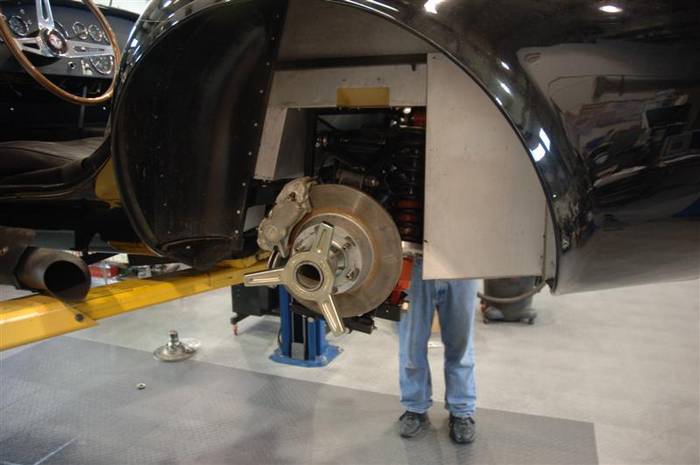
Last edited by David Kirkham; 09-04-2007 at 06:00 PM..
|

09-04-2007, 01:02 PM
|
 |
CC Member

|
|
|
Join Date: Mar 2001
Location: Provo,
Ut
Cobra Make, Engine: Kirkham, 427
Posts: 6,990
|
|

 Not Ranked
Not Ranked
Here is a picture of an original front suspension on a 427 Street Cobra. Notice the front caliper is cast iron--just like the rear. It is also a very strange 3 piston unit. Notice the rotor (hard to see in this photo) is solid--just like the rear rotors.
Finally, notice the hub cap is missing. If you are REALLY good you will also notice the funny golden color of the spindle in the photo. That is because Sandwich is faster than senor dumb fingers here at the keyboard. (Funny, I can play Chopin Nocturne 27.2 but keep hitting wrong keys as I type!) Anyway, Sandwich has already changed this side out. Oops! I just gave away the plot...
He just hasn't put the hub cap back on yet.
 |

09-04-2007, 01:04 PM
|
 |
CC Member

|
|
|
Join Date: Mar 2001
Location: Provo,
Ut
Cobra Make, Engine: Kirkham, 427
Posts: 6,990
|
|

 Not Ranked
Not Ranked
Notice the cool Koni shock! (Cool, but HEAVY!)
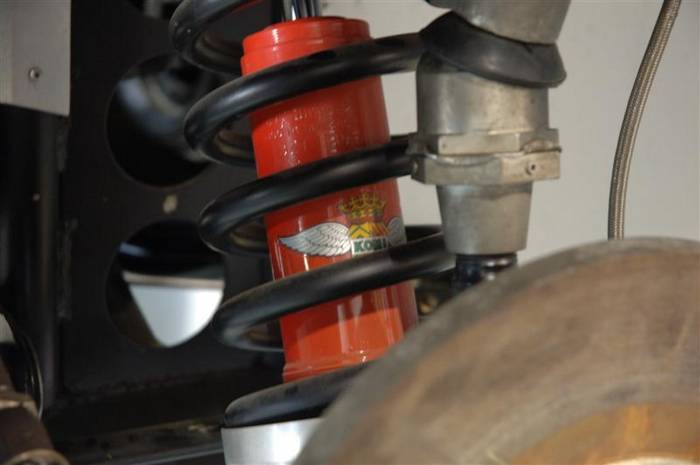 |

09-04-2007, 01:08 PM
|
 |
CC Member

|
|
|
Join Date: Mar 2001
Location: Provo,
Ut
Cobra Make, Engine: Kirkham, 427
Posts: 6,990
|
|

 Not Ranked
Not Ranked
Here is a picture of the other side. This is a really good shot of an original front upright, front steering arm, front upper ball joint, and steering rack. Notice how it is missing the spindle (front axle), front hub, and front rotor. Speedy Gonzales got to that before I could take a shot.
So, why did we take the front spindle out???
 |

09-04-2007, 01:20 PM
|
 |
CC Member

|
|
|
Join Date: Mar 2001
Location: Provo,
Ut
Cobra Make, Engine: Kirkham, 427
Posts: 6,990
|
|

 Not Ranked
Not Ranked

Here is the reason why you saw a front spindle AND front hubs in the oven. You see, the front spindle is a VERY WEAK link on an original car. The spindle is only 1.250 inches in diameter so it flexes quite terribly under hard braking and driving. When the spindle flexes, the rotor moves around and knocks the brake pads back away from the rotor.
So, when you step on the brakes at the end of the straight, your pedal travels further down than you expect it to before it engages. Then you miss your braking point, you panic, and try to jam the brake pedal to the floor before this big wall of black tires prints "Goodyear" all over your car (and you).
If you are lucky, you are driving at Miller Motorsports Park when this happens where there is a ton of run off and you simply pretend you are Michele Kwan and do a few (not so graceful) pirouettes. The worst part of the experience is the inevitable black flag pointing your direction telling you to return to the pits--where you will be greeted by a rousing standing ovation by all your friends. Spin off turn 9 at Willow, and well, you just might be greeted by the ambulance crew.
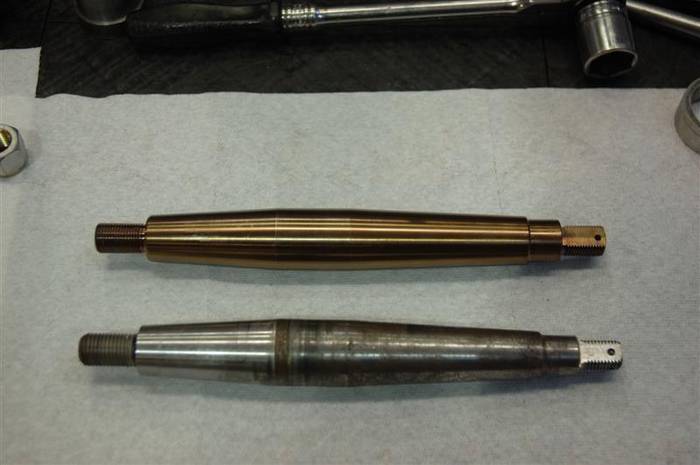
Last edited by David Kirkham; 09-05-2007 at 08:39 AM..
|

09-04-2007, 01:27 PM
|
 |
CC Member

|
|
|
Join Date: Mar 2001
Location: Provo,
Ut
Cobra Make, Engine: Kirkham, 427
Posts: 6,990
|
|

 Not Ranked
Not Ranked

The reason you saw front spindles AND front hubs in the oven is because we make our front hubs identical (well, almost) to our rear hubs. The diameter of our "spindle" is 1.773 inches. The diameter of an original spindle is 1.250 inches. Stiffness goes up with the square (did I remember that right??? I think it may even be a cube or even 4th power function) of the diameter of the bar. Anyway, it goes up VERY FAST as you increase diameter.
We do not use a "front spindle/axle" that a hub rotates on. Our hub has a spindle directly machined on it that rotates with the hub all in 1 piece. It is much, much stiffer that way. This is how a rear suspension rotates. That is why we had both front hubs (ours) and front axles (original) in the oven at the same time.
The small spindles you saw in the oven are original spindles we made for this original car we are working on. We just made a few extras while we were set up and making them.
Here is a picture of an original spindle (the ugly, crappy looking one on the bottom) and our beautiful spindle on top--perfect in every way, shape and form.  That is, until someone comes up with something better, probably tomorrow.

Last edited by David Kirkham; 09-05-2007 at 07:32 AM..
|

09-04-2007, 01:36 PM
|
 |
Senior Club Cobra Member

|
|
|
Join Date: Sep 2000
Location: Holderness, NH, US of A,
NH
Cobra Make, Engine: CSX 4772 old iron FE
Posts: 5,499
|
|

 Not Ranked
Not Ranked
Good stuff, I'm thinking the temperature might be a bit misleading. Dark straw is less than 500 deg (approx 475) as a temper color? Maybe a trick question David?? I would think 4140 would be a good material for those components but you mention corrosion which is why the stainless was mentioned. Corrosion could be from no seals on originals which you are obviously adding to yours..........
|

09-04-2007, 01:38 PM
|
 |
CC Member

|
|
|
Join Date: Mar 2001
Location: Provo,
Ut
Cobra Make, Engine: Kirkham, 427
Posts: 6,990
|
|

 Not Ranked
Not Ranked
Now we get to the nitty gritty of why we do what we do and our general philosophy/culture on making parts.
Now for the Achilles Heel of the front suspension. The front axle. LOOK AT THAT RUST!!!
Oh, it is just a little surface rust you say...WRONG!!!
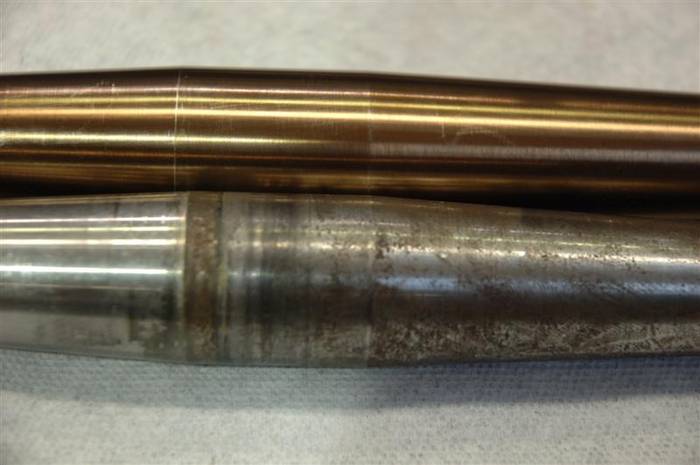 |

09-04-2007, 02:32 PM
|
 |
CC Member

|
|
|
Join Date: Mar 2001
Location: Provo,
Ut
Cobra Make, Engine: Kirkham, 427
Posts: 6,990
|
|

 Not Ranked
Not Ranked

Welcome to the nasty world of intergranular corrosion and stress corrosion cracking. The longer I am in the business, the more I learn, and the more nervous I become.
As most of you know, the original Cobra used some pretty lousy materials in some areas. They were trying to keep costs down. That is common knowledge.
But most surprisingly, and certainly NOT common knowledge, is the fact they used EXTREMELY high quality steel for their spindles and rear hubs. It is a highly nickel modified 4340. In England they call it EN30B. I just call it expensive. It is about the highest strength steel you can get. It is incredibly tough, it is incredibly durable. It is an incredibly lousy choice for long term corrosion protection and who wants their Chariot of Fire to RUST 
Now, all steel rusts. Everyone knows that. Just look under your daily driver--be it a Ford GT, a Ferrari Superamerica, or a Pinto. The normal steels used in automotive production rust.
On our earlier cars, we used to make our hubs and spindles out of 4340. Just go to any racing site and they will proudly tell you they make their parts (crankshafts, connecting rods, hubs, spindles, axles, etc.) out of 4340. It is a great material for unbreakable (or almost unbreakable) parts that you are going to use today. If you plan on using them 20-30-40 years from now...maybe ought to try something else. If you live in Florida...you definitely should use something else--unless you like rust.
We have been in business now for 13 years and we are now starting to see some of our cars that have been out to battle for some time coming back for repairs, upgrades, modifications, etc. And we are starting to see rust...I hate rust.
You see, very highly alloyed steels (like EN30B and 4340) will rust if you look at them. (Worse, they even rust when you aren't looking at them...rust never sleeps.) If you take a freshly machined piece of 4340 and put it under hot water, you will literally be able to watch it rust in seconds.
The problem with corrosion is the higher strength the steel, the faster it rusts! WORSE, it rusts even faster under stress! AND WHERE DO HIGH STRENGTH PARTS RESIDE??? IN HIGH STRESS AREAS, OF COURSE!  There just ain't no free lunch (unless you vote for Hillary). So, if you bend the part (like a SPINDLE or a HUB) then the part will corrode FASTER! Starting to get heartburn??? Pass the Tums. It isn't going to get any better any time soon. It is actually going to get worse...
Intergranular corrosion. The most insidious monster of all. Just like the name says, corrosion follows the alloying agents right down the grain boundaries into the part! Oh man. Did you read what I just wrote? Corrosion follows the alloying agents...like chrome, molybdenum, nickel...you get the point yet? I know I got the point--right in my rear end!
If you were to take the above pictured spindle and cut through one of the rust spots you would need to bust out the Depends. The rust spot will actually be BIGGER UNDER THE SURFACE than it is on the surface. (Remember, we have 40 years of corrosion going on here.) I actually did that on an original spindle. I cut it and saw the rust spot get BIGGER--but I have misplaced the spindle or I would post a picture. It is enough to make you weak in the knees.
So,
There must be a better way.
There is...17-4 PH stainless. There must be some disadvantage you say...there is; it is only 4 TIMES MORE EXPENSIVE THAN 4340!!! 
BUT
It is extremely corrosion resistant. The surface will rust under really nasty conditions, but it is about as impervious to rust as you can get in these strength levels. We "heat treat" or more accurately "age" our 17-4 parts to H900 (900 degrees) for maximum strength. In the H900 condition they have an ultimate of 190,000 psi and end up in the 40's Rockwell C. I got this tip from a customer who makes parts for the space shuttle. He told me "Half of the parts on the space shuttle are 17-4. I know, because I made them!" Now, I don't know how much of that was hyperbole, but you get the point. The stuff is as bulletproof as you can get...at least in reasonable price ranges. (If you want to talk about unreasonable price ranges, we can start talking about Maraging 250, 300, and 350. But only George Bush can afford that stuff--$30-$60/POUND! Maraging 350 has an ultimate tensile strength of 350,000 psi!!! It is used in missile cases where it can be run extremely thin because it is so strong. Thinner means lighter and lighter means more weight capacity for BOOM to reach out and touch someone.
Last edited by David Kirkham; 09-05-2007 at 08:50 AM..
|

09-04-2007, 02:55 PM
|
 |
CC Member

|
|
|
Join Date: Mar 2001
Location: Provo,
Ut
Cobra Make, Engine: Kirkham, 427
Posts: 6,990
|
|

 Not Ranked
Not Ranked

In this picture you can see our spindle on the right and the original spindle on the left. See how we relieved the threads at the end of the thread and the original spindle did not? We did that because the final thread in an unrelieved thread is the weakest point in the part. That final thread on the original spindle has a sign on it that says "BREAK HERE."
In this picture I noticed the cotter pin hole has not been deburred! Naughty, naughty! Sandwich deburred the hole when he noticed it. It sucks to do after aging as the metal gets much harder! So you need to remember to deburr FIRST!!! You MUST deburr all holes and sharp corners to reduce stress risers.
Notice we carefully radiused the junction from the minor diameter of the thread to the outer bearing surface. The outer bearing surface was machined 0.0003 inch TOO LARGE as precipitation hardening alloys shrink when they are hardened. With our CNC lathe we are able to hold 0.0002 inches so there is no need for grinding the surface if you pay attention to the machine.
NOTE!!!
Notice we made the outer bearing diameter LARGER than the original bearing. We changed the outboard bearing from 0.7500 to a Set-12 which measures 0.8656 inches. The increased diameter spindle helps the devilish spindle flex by making the spindle stiffer--and stiffer is BETTER! 

Last edited by David Kirkham; 09-05-2007 at 08:59 AM..
|

09-04-2007, 02:57 PM
|
 |
CC Member

|
|
|
Join Date: Mar 2001
Location: Provo,
Ut
Cobra Make, Engine: Kirkham, 427
Posts: 6,990
|
|

 Not Ranked
Not Ranked
|

09-04-2007, 03:07 PM
|
|
CC Member

|
|
|
Join Date: Jun 2004
Location: Christchurch,
NZ
Cobra Make, Engine: Ram 427 SC CSX6042. Chev 355. Quad Weber DCNFs
Posts: 208
|
|

 Not Ranked
Not Ranked
Quote:
|
Originally Posted by David Kirkham
FIA-ERA
Bonus question?
Why do we have a front hub AND a front axle in the oven?
Still open--alloy and heat treat specs????
David
   |
Is it something to do with the hard steel (bullet proof) fasteners you are using? The hub and the spindle have to be equally hard to avoid erosion?
__________________
Cheers
Myles D-W
|

09-04-2007, 03:15 PM
|
 |
CC Member

|
|
|
Join Date: Mar 2001
Location: Provo,
Ut
Cobra Make, Engine: Kirkham, 427
Posts: 6,990
|
|

 Not Ranked
Not Ranked
mylesdw,
Actually increasing hardness generally increases the risk of corrosion. The reason we have both front hubs and front spindles in our oven is because we have our own front hubs we use on our billet suspension along with the front spindles for original Cobra restorations (and our very early cars that ran that suspension).
David
  
Last edited by David Kirkham; 09-04-2007 at 03:31 PM..
|

09-04-2007, 03:45 PM
|
|
Banned

|
|
|
Join Date: Oct 2003
Location: Yorba Linda,
CA
Cobra Make, Engine: SPF w/392CI stroker
Posts: 3,293
|
|

 Not Ranked
Not Ranked
Great, David! Thanks a lot! Now we are all going to go home and stare at our lowly FFRs, Hurricanes, BDRs, SPFs, first gen Kirkhams....heck, even the 'real McCoy' original CSX cars that some here own, and immediately start losing sleep because of all the creepiness and unknowns that lurk deep within the very steel that keeps our cars going straight and true (or fast around corners while staying intact). 
-Dean
P.S. AWESOME thread...thank you for the education (I think!) |

09-04-2007, 04:40 PM
|
|
Club Cobra Member

|
|
|
Join Date: Feb 2003
Location: Sterling,
IL
Cobra Make, Engine: SPF #1507 427 Dart Block Windsor
Posts: 1,192
|
|

 Not Ranked
Not Ranked
David,
THANK YOU SO MUCH for taking the time and effort to post and explain all this information that you had to learn the hard way!
Lowell
|

09-04-2007, 04:46 PM
|
 |
CC Member

|
|
|
Join Date: Mar 2001
Location: Provo,
Ut
Cobra Make, Engine: Kirkham, 427
Posts: 6,990
|
|

 Not Ranked
Not Ranked
Here is a picture of the spindle going back into the front upright. Sorry for the blur! It looks like there aren't any threads on the end of the spindle, but I assure you they are there!
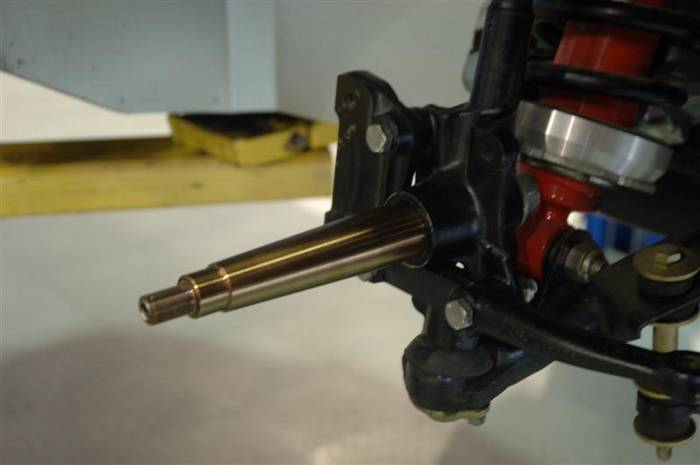 |
 Posting Rules
Posting Rules
|
You may not post new threads
You may not post replies
You may not post attachments
You may not edit your posts
HTML code is Off
|
|
|
All times are GMT -7. The time now is 06:30 AM.
|
|



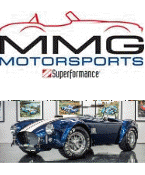
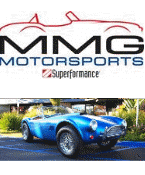

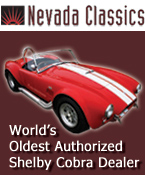
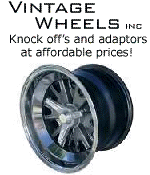
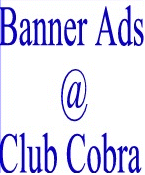
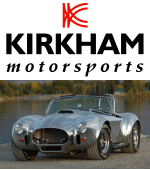

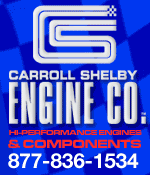
 1Likes
1Likes






 That is, until someone comes up with something better, probably tomorrow.
That is, until someone comes up with something better, probably tomorrow.



 Linear Mode
Linear Mode



